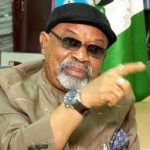•Reps caucus urges presidential assent to avert political crisis
The Supreme Court, yesterday, granted Rivers State’s request to be joined as an interested party in a suit seeking to void the controversial Section 84 (12) of the Electoral Act 2022.
The seven-man panel, presided over by Justice Musa Dattijo Mohammed, agreed with counsel to the plaintiffs, Emmanuel Ukala (SAN), before adjourning to May 26.
Consequently, the apex court joined Speaker of Rivers House of Assembly and the Attorney General as second and third defendants following concession by President Muhammadu Buhari’s lawyer, Prince Lateef Fagbemi (SAN).
The claimants had, in their application, argued that the subject matter in the originating summons applies nationwide.
They said their interest in the suit was informed by the outcome that would affect them.
The Rivers chief law officer observed that the state “is constitutionally bound to be governed democratically in accordance with the letters and spirit of the constitution.”
In the lawsuit filed on April 29, 2022 and marked SC/CV/504/2022 by the President and Attorney General of the Federation, wherein they are maintaining that the contentious section is in conflict with constitutional provisions, originally had the National Assembly as sole defendant.
But the applicants pointed out that the constitution had spelt out qualifications for offices of the President, Vice President, governor, deputy, senator, members of House of Representatives and state Assemblies, ministers, commissioners and special advisers.
Contending, Buhari and Malami prayed the court to declare that, by the “joint and or combined reading of Sections 65, 66, 106, 107, 131, 137, 147, 151, 177, 182, 192 and 196 of the Constitution of the Federal Republic of Nigeria, 1999 (as amended), the provision of Section 84 (12) of the Electoral Act, 2022, which also ignores Section 84(3) of the same Act, is an additional qualifying and/or disqualifying factors for the National Assembly, House of Assembly, gubernatorial and presidential elections as enshrined in the said constitution, hence unconstitutional, unlawful, null and void.”
They sought: “A declaration that having regard to the clear provision of Section 1(3) of the Constitution of the Federal Republic of Nigeria, 1999 (as amended), read together with Section 4 of the same Constitution, the legislative powers vested in the defendant do not permit or empower it to make any other law prescribing additional qualifying/disqualifying grounds for election into the National Assembly, House of Assembly, gubernatorial and presidential seats outside the express constitutional qualification and disqualification provisions as already provided in each or all of Sections 65, 66, 106, 107, 131, 137, 147, 151, 177, 182, 192 and 196 of the 1999 Constitution of the Federal Republic of Nigeria (as amended), and without amendment to any of those sections is for reason of inconsistency, unconstitutional and therefore null and void.
“A declaration that Section 84 (12) of the Electoral Act, 2022 disqualifying a political appointee from being a voting delegate or be voted for at a convention or congress of any political party for the purpose of the nomination of candidates for any election is discriminatory, inconsistent with and in violent breach of the provision of each or all of Sections 42, 65, 66, 106, 107, 131, 137, 147, 151, 177, 182, 192 and 196 of the Constitution of the Federal Republic of Nigeria, 1999 (as amended), as well as Article 2 of the African Charter on Human and Peoples Rights.”
IN a related development, the Minority Caucus in the House of Representatives has urged the President to immediately sign the single amendment to the law, transmitted to him since last week to avert political crisis in the country.
In a statement, yesterday in Abuja, by the Green Chamber’s Minority Leader, Ndudi Elumelu, the lawmakers submitted: “The caucus notes with grave concern that Mr. President’s delay in signing the single amendment to Section 84 (8) of the Electoral Act 2022 has thrown the nation into serious confusion and constitutes a huge threat to our democracy and the smooth conduct of the 2023 general elections.”
They said any further delay had capacity to derail the entire democratic process and destabilise the most populous black nation.
Source: Guardian.ng

















